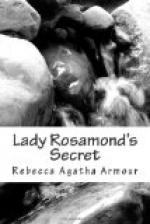of hilarious impatience were amusing in the extreme.
At the appointed hour, the usual ceremonies of introduction
being passed, the company were at last seated.
And such a table! Such an array that one would
only get into difficulty by attempting to describe
it. Captain Douglas occupied a seat to the right
of Lt. Col. Tilden and received that attention
which characterizes Sir Thomas. Mr. Howe, once
more on friendly footing, was assigned a seat beside
the incorrigible Captain Hawley, whose choice epithets
produced such sensitive effects upon the ears of the
secretary sometime previous. Major McNair, a
brusque, genial, stout-hearted soldier, always ready
to do the honors of the Regiment under his charge,
had on his right Captain Hawkins, an American officer;
on his left an American youth and nephew of the officer.
The convivial resources of these dinners were of a
nature sometimes loud, boisterous, and exhilarating.
Though indulging in countless practical jokes, various
scenes of carousal, revels, mingling with toast upon
toast, cards and amusements, there was a general good
feeling throughout the whole proceedings. Misunderstandings
sometimes led to sharp words, but the intervention
of a superior had a healing effect. In nowise
did Lieutenant Trevelyan receive so many taunts from
his fellow officers as for habits of moderation.
They often dubbed him “Saint Guy, the cold water
man,” which only served to amuse the young Lieutenant.
The attention of the American was often directed to
Mr. Trevelyan, listening with deep interest to the
history of the young man and his distinguished father.
“Lieutenant Trevelyan is a gentleman in every
sense of the term,” said the Major. “There
is no need of that explanation, sir,” said the
American; “it is written in bold outline upon
his handsome boyish face. His father will yet
be proud of such a son.” “The words
of His Excellency,” returned the Major.
In the flow of general conversation that ensued many
pretty speeches were made by the military and responded
by several citizens, gentlemen who were frequent guests
at dinner. Sir Thomas Tilden arose, complimenting
Captain Douglas on his success, hoping that they may
meet soon on the same business. This called from
the gallant and handsome Captain one of his most witty
and humorous speeches, after which Captain Hawley
sang Rule Britannia with the entire company in a deafening
chorus. After a short pause, cries of “Howe!
Howe!” Nothing short of an oration would satisfy.
The secretary rose and delivered something which would
take some investigation to classify either as an epic,
oration, or burlesque. They wanted variety and
such it was. A puzzled expression rested on Lieutenant
Trevelyan’s face as he tried to follow Mr. Howe
in the lengthy harangue.




